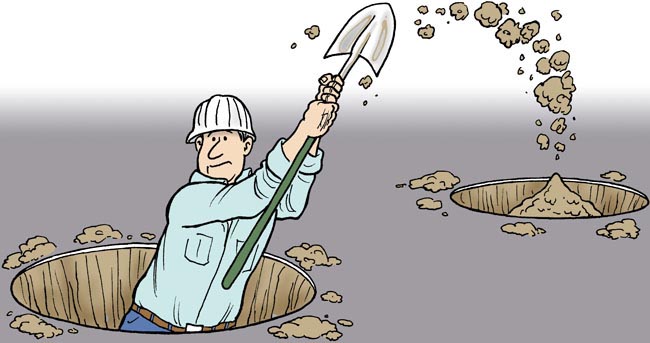Busywork — or “shallow work” — is very common in first-world, white-collar enterprise companies. If we’re being completely honest, some research has shown 7 in 10 employees have no idea what to do all day. Other research has shown 21.4 million middle managers add no economic value back to their companies, and still more has shown $15.5 million in lost productivity annually from mid-size companies because of this. If you’ve ever had a big corporate job, you’re probably familiar. There is definitely a lot of “hurry up and wait” in those roles, and also a lot of thumb-twiddling.
Makes sense, of course: many people are hired from a rushed headcount process that was ultimately designed to fill an immediate need with no regard for six-eight months hence. On top of that, the hiring process itself sucked — probably alienated, rather than drew in, the best candidates — and the job role made no sense. In such a contextual process, busywork is born.
Now, busywork isn’t necessarily a bad thing at the individual level. People, especially Americans, love to be busy. (One reason is because it makes them feel high.)
[Tweet “In many companies, being busy is more important than being value-add.”]
The problem, however, is that “busy” doesn’t mean the same thing as “productive.” The goal of most organizations is productivity, not busywork. (Well, you’d hope.) So how can we buck this cycle and prevent busywork?
Busywork and priority
This is the first step to understand. Most organizations are very bad at priority management. That creates a lot of busywork — and “sense of urgency” projects that burn people out. So at the organizational level, you have a lack of priority. Now scale down to the individual level. Most people use their time very poorly. Most enterprise employees I’ve ever worked with would be fine spending 9am – 7pm just emailing and answering emails. That’s a ludicrous waste of time, but to many people it would feel super productive. “Got a lot done today, Jane!” At the intersection of “organizational lack of priority” and “individual wasting of time,” you find a lot of busywork.
How do we eliminate busywork, then?
From this article, which claims that busywork is holding your career progress back:
Prepare a list of small but important tasks you can do in five- to 10-minute intervals to keep you on track, such as catching up on reading, emails, or scheduling. “You’ll get through these busywork tasks during the day, rather than having them pile up at the end of the day, and thank yourself for finally getting out of work on time,” says Scherwin.
Big fan of this. Let me go a little bit deeper.
The 15-minute pocket rocket
The 15-minute pocket rocket, to me, is the essence of business productivity. Since that sounds sexual, let me explain what it means. You can find 15 minutes here and there all the time throughout a day/week. If you add those up and do the shallow busywork then, you end up being super productive compared to your co-workers.
Consider this: a lot of people love to put themselves on the cross about how hard they work, and how much they dedicate to work on the weekends. By and large, this is chest-pounding bullshit. They probably answer an email at 10pm on Saturday to “seem connected,” after having not thought about work all day.
But what if you did this? Let’s say you wake up at 9am, and you have brunch plans at 11am. A lot of people spend those two hours watching TV, reading, making coffee, etc. What if you spent 1 hour and 30 minutes doing that — and 30 minutes getting ahead on Monday work? This is a huge productivity advantage and it took 30 minutes out of your “Meet the Press” time. It also reduces the need for busywork on Monday. This is so easy, and yet, so many people would never do it — even though these are the same people who would tell you how hard they worked all weekend.
Busywork and automation
One of the graver concerns people have about automation is busywork. What that means is: when a person critically and realistically looks at their job, they secretly know a robot could do it. So much of first-world work in the digital age is just paper-pushing from A to B, and CRMs and other tools changed a lot of that already. Conventional middle management should be dead by now, as most of those guys are digital paper-pushers who loudly proclaim their relevance daily. It’s not yet dead for a host of reasons — one of which is everyone thinking they’re so busy and need more people — but it probably should be. If I buy a CRM and Mikey Middle Man’s job was to tell me “about the numbers,” well, Mikey is less relevant. The software can now do that.
We’ll never fully move away from busywork — all jobs require some degree of it, and many of us are obsessed with the quantity of work we do (as opposed to quality) — but thinking about productivity and time differently might help us stave off the robots for another seven years.
What else would you add about the role of busywork in business culture?
